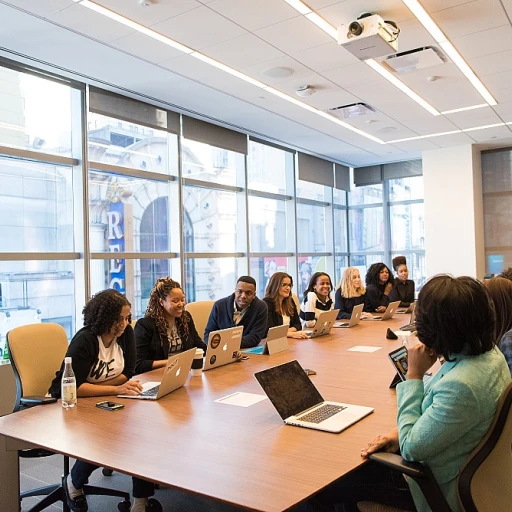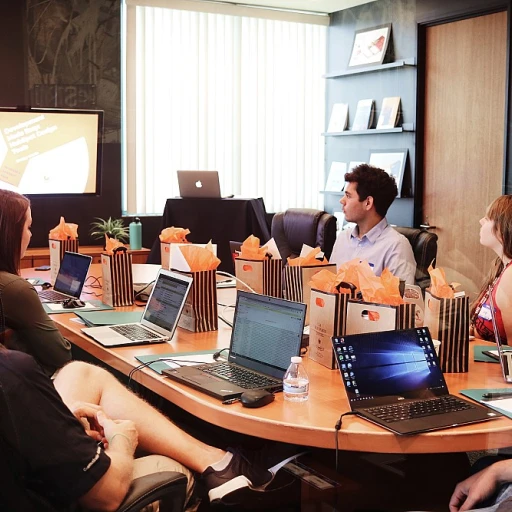
Understanding the importance of team building in small groups
The Value of Connection in Small Group Settings
When it comes to team building, the size of the group can make a big difference in how activities are experienced and the impact they have. In smaller groups, each team member has more opportunities to participate, share ideas, and develop communication skills. This creates a unique environment where team bonding and collaboration can flourish, often leading to stronger relationships and more effective teamwork.
Small group team building activities are not just about having fun or playing games. The purpose goes deeper: these activities help people build trust, improve problem solving, and encourage open communication. Whether it’s a quick five-minute icebreaker or a longer escape room challenge, the right activity can help team members feel more connected and valued. This is especially important in today’s work environments, where teams may be remote, hybrid, or working in flexible arrangements.
- Team building games and exercises can be adapted for any group size, making them great for both in-person and virtual teams.
- Activities like indoor team games or short duration exercises are perfect for small groups, helping everyone get involved without feeling overwhelmed.
- Building activities also support team collaboration by encouraging members to work together towards a common goal.
For HR professionals, understanding the dynamics of small groups is essential for designing effective team building sessions. The right group team activities can make a real difference in how people interact and perform at work. If you’re interested in learning more about how human resource management practices can support team building and collaboration, you can explore effective HR strategies for team success.
Challenges HR faces with small group dynamics
Unique Dynamics in Smaller Teams
Working with a small group brings its own set of challenges for HR professionals. Unlike larger teams, where roles and responsibilities are often clearly divided, small groups require each team member to wear multiple hats. This can make team building activities both more intimate and more complex. The group size means that every person’s participation is visible, and the success of any building activity relies heavily on the engagement of all team members.
Common Obstacles in Small Group Settings
- Limited diversity of skills: With fewer people, the range of skills and perspectives is naturally smaller. This can impact problem solving and creativity during team building games or activities.
- Group dynamics: In a small group, personal relationships can have a bigger impact. If two members don’t get along, it can affect the whole team’s collaboration and communication skills.
- Activity selection: Some building activities or games are designed for larger teams and may not translate well to a group of five or six. Finding the right indoor team or virtual team building exercises that are fun and engaging for a small group can be tricky.
- Time management: With fewer participants, activities may take less time than planned. HR needs to ensure that the duration minutes for each building activity are appropriate for the group size.
Why HR Needs to Adapt
HR professionals must be creative and flexible when planning team building for small groups. The purpose is not just to have fun, but to strengthen team bonding, improve communication skills, and encourage team collaboration. Activities like escape room challenges or quick building games can be great for small groups, but they need to be tailored to the team’s unique needs and the work environment.
For more insights into how HR professionals navigate these challenges, you can read about the role of a workforce integration manager in HR job interviews.
Creative team building activities for small groups
Fresh Ideas for Team Bonding in Small Groups
When it comes to team building activities for small groups, the key is to focus on engagement, communication skills, and collaboration. Smaller group size means every team member can participate fully, making the experience more personal and impactful. Here are some creative team building games and exercises that work well for groups of 3 to 10 people, whether you’re in the office or working with a virtual team.
- Escape Room Challenge (Duration: 30-60 minutes): This popular team building activity can be done in-person or online. Teams work together to solve puzzles and unlock clues, encouraging problem solving and team collaboration. For virtual teams, there are many digital escape room options that keep people engaged and connected.
- Two Truths and a Lie (Duration: 10-15 minutes): Each team member shares two true facts and one falsehood about themselves. The group tries to guess the lie. This fun game helps break the ice and builds trust among team members.
- Marshmallow Tower (Duration: 20 minutes): Using only spaghetti, tape, and a marshmallow, small groups compete to build the tallest tower. This indoor team building exercise promotes creativity, teamwork, and quick problem solving.
- Show and Tell (Duration: 10 minutes per person): Each team member brings an item that represents something important to them. This activity encourages people to share personal stories, building empathy and deeper connections within the group.
- Mini Hackathon (Duration: 60 minutes): Teams are given a simple challenge related to their work and must come up with a solution in a set time. This is a great way to foster innovation and team bonding, especially for small groups in tech or creative fields.
For remote or hybrid teams, many of these building activities can be adapted to virtual platforms. The purpose is always to create a space where team members feel comfortable, can play and learn together, and develop stronger communication skills. When choosing activities, consider the group size, available time, and the specific goals you want to achieve—whether it’s improving team collaboration, building trust, or simply having fun.
For HR professionals looking to streamline the process of organizing and tracking team building exercises, werving en selectie software can be a great tool to support your efforts and measure outcomes.
Adapting activities for remote or hybrid teams
Making Team Building Work for Remote and Hybrid Groups
Remote and hybrid teams face unique challenges when it comes to team building. Physical distance can make it harder for team members to connect, but with the right activities, even small groups can build strong bonds and improve collaboration skills. The key is to adapt traditional team building games and exercises to fit a virtual or hybrid environment, ensuring everyone feels included and engaged.- Virtual Escape Room: This activity is a great way to encourage problem solving and communication skills. Teams work together online to solve puzzles and "escape" within a set duration, usually 45 to 60 minutes. It’s fun, interactive, and suitable for groups of any size.
- Online Team Trivia: Divide your group into smaller teams and play trivia games using video conferencing tools. This game helps team members learn more about each other and builds team bonding in a relaxed setting.
- Show and Tell: Each team member shares something personal or work-related with the group. This simple activity can break the ice and foster a sense of connection, especially in small groups.
- Virtual Coffee Breaks: Schedule informal video calls where people can chat about non-work topics. These short sessions (15-20 minutes) help build relationships and trust among remote team members.
- Collaborative Online Whiteboards: Use digital tools to brainstorm ideas or play drawing games. This encourages creativity and team collaboration, even when everyone is working from different locations.
Measuring the impact of team building during interviews
Evaluating Team Building Outcomes in Interviews
Measuring the impact of team building activities during interviews is a practical way for HR professionals to assess how well candidates or current team members collaborate and communicate. When you organize a team building activity, it’s not just about having fun or playing a quick game. The real purpose is to observe group dynamics, problem solving, and communication skills in action.- Observe group interaction: Pay attention to how team members communicate during activities. Are they listening to each other? Do they encourage participation from all group members, regardless of group size?
- Assess collaboration: Look for signs of effective team collaboration. For example, in a building game like an indoor team escape room, see if people naturally take on roles or if one person dominates the group.
- Evaluate problem solving: Many building activities, such as group games or team bonding exercises, are designed to test how teams solve problems together. Notice if the group can find creative solutions within the duration minutes of the activity.
- Check engagement and fun: A great team building activity should be enjoyable. If team members are having fun, it’s a good sign they’re comfortable working together. This can be especially important in small groups where every team member’s participation matters.
Key Metrics for Measuring Success
Using a few simple metrics can help you measure the effectiveness of your team building exercises:| Metric | What to Look For |
|---|---|
| Communication Skills | Clear sharing of ideas, active listening, and respectful feedback among group team members |
| Problem Solving | Ability to work together to overcome challenges in games or activities |
| Participation | All team members are involved, regardless of group size |
| Time Management | Completing the building activity within the set duration minutes |
| Team Bonding | Improved trust and rapport among people after the activity |
Practical Tips for HR Professionals
- Choose activities that match the group size and purpose. For small groups, games that require everyone to participate are more effective.
- Use both indoor team exercises and virtual team building games to see how team members adapt to different environments.
- After the activity, ask for feedback. This helps you understand what worked and what could be improved for next time.
- Remember, the goal is not just to play games but to build stronger, more collaborative teams that work well together in any setting.
Tips for facilitating successful team building sessions
Setting the Stage for Participation
Creating a welcoming environment is essential for any team building activity. Start by clarifying the purpose of the session and how it will benefit the group. When people understand the goal—whether it’s improving communication skills, fostering team bonding, or enhancing problem solving—they are more likely to engage. Adjust the group size and activity type to match your team’s needs. For example, a small group might thrive with a collaborative escape room game, while a larger team could benefit from indoor team building exercises that encourage team collaboration.Choosing the Right Activities for Your Group
Selecting suitable building activities is key. Consider the group’s size, the available time (duration minutes), and the diversity of team members. Fun games like quick icebreakers or longer building games can help break down barriers. For remote or hybrid teams, virtual team activities such as online escape rooms or problem solving challenges work well. Always ensure the activity is inclusive and accessible for all members.- Match the activity to the group’s energy and interests
- Set clear instructions and objectives
- Allow enough time for each activity—some games need only 10 minutes, while others may require more
Facilitating Engagement and Reflection
Active facilitation makes a big difference. Encourage every team member to participate, but respect different comfort levels. Rotate roles within the group team to give everyone a chance to lead or contribute. After each building activity, take a few minutes to debrief. Ask the team what worked, what was fun, and how the activity supported team collaboration or communication skills. This reflection helps reinforce the value of the session and allows people to connect the experience to their daily work.Adapting On the Fly
Be flexible. Sometimes, an activity may not go as planned, or the group dynamic might shift. Have a backup game or exercise ready, and be open to feedback from team members. The best team building sessions are those where the facilitator adapts to the needs of the group, ensuring everyone feels included and the purpose of the session is met.Practical Tips for Success
- Prepare all materials in advance, especially for indoor team or virtual team activities
- Keep instructions simple and clear
- Monitor the group’s energy and adjust the pace as needed
- Celebrate small wins and encourage positive feedback among team members
- Track participation and outcomes to measure the impact of your team building exercises over time













